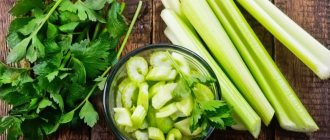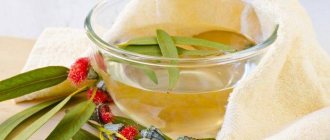Pregnant women, in order to avoid taking synthetic drugs that can harm the baby, resort to using folk remedies for edema, since in practice they are quite effective and safer. One of these drugs is bearberry during pregnancy, which has the second name bear's ears. However, it is also worth understanding that you should not self-medicate with any herbal preparations during pregnancy; in addition to possible benefits, they can also bring negative consequences.
Bearberry during pregnancy - composition and beneficial properties of the plant
Bearberry (or “bear ears”) is a popular and well-known plant that is widely used in both folk medicine and cosmetology. In the preparation of medicinal compositions, not only the leaves, but also the berries of the plant are actively used. The healing properties of bearberry are manifested thanks to the active biological compounds it contains.
These include:
- Glucoside arbutin.
- Flavonoids.
- Organic acids (including formic, gallic and quinic).
- Ascorbic acid.
- Mineral compounds.
- Tannins.
These compounds have determined the beneficial properties of the plant, which can be valuable for the human body.
- The main component that determines the medicinal effect of bearberry is arbutin. After penetration into the body, this substance breaks down into 2 components - glucose and hydroquinone. It is the latter that provokes the diuretic effect of taking bearberry. This compound also has antiseptic properties.
- Tannins will have a positive effect on disorders of the gastrointestinal tract (for example, diarrhea).
- Flavonoids exhibit pronounced activity in the fight against pathogenic organisms - viruses and bacteria.
- The antimicrobial effect is enhanced by the action of ursulic acid present in bearberry.
- Gallic acid is a powerful antioxidant that neutralizes free radicals.
Methods of use
Bearberry is used as a medicine not only in folk medicine, but also in traditional medicine.
Doctors prescribe this drug to patients with diseases of the genitourinary system, urethra and bladder.
It can be used as a stand-alone drug or as part of combination medications. The most widespread use for bear ears is in alternative healing.
There are a wide variety of medicines based on this plant, prepared in different ways and in different forms.
Most often, a decoction is prepared from the leaves of bear ears , which can be used both internally and externally. It has excellent antiseptic, antibacterial and wound healing properties.
To treat inflammatory processes in the genitourinary system, an infusion of dry leaves is prepared . To do this, they are poured not with boiling water, but with cold water, after which they are left for about a day in a cool, dark place.
Immediately before use, it is heated to 30-36 degrees and taken warm.
To normalize the functioning of the nervous system, an alcohol-based tincture is made . You can also use regular vodka. It is recommended to use just a few drops a couple of times a day.
Considering the contraindications of bearberry itself and the presence of alcohol in the tincture, pregnant women in this form are categorically not recommended to use this remedy .
Indications for taking bearberry formulations during pregnancy
Based on the properties of the chemical compounds that make up bearberry, it is recommended to take decoctions based on it in order to relieve inflammatory foci in the organs of the urinary system (kidneys, bladder). As part of complex therapy, bearberry can be prescribed for cystitis, urethritis, and pyelitis.
In addition, a doctor may recommend a decoction of bear ears to a pregnant woman in the following cases:
- Using the powerful diuretic effect of the plant, a decoction of bearberry is often recommended as a means of combating edema. Under the influence of the plant's components, salts and excess fluid are removed from the pregnant woman's body.
- “Bear ears” also have a beneficial effect on the functioning of the nervous system - they reduce irritability and eliminate the problem of insomnia.
- A healing decoction will reduce the frequency and intensity of heartburn.
Attention! The decision to prescribe a bearberry-based decoction to a pregnant woman can only be made by a doctor. A woman should carefully monitor her well-being and, if any negative reaction occurs, stop therapy and notify the doctor. Self-medication is strictly prohibited!
Chronic cystitis in women: symptoms and treatment
Chronic cystitis does not appear on its own, but is the result of untimely and (or) improper treatment of the acute form. The frequency of diagnosis of the chronic form depends on several factors:
- individual predisposition, combined with poor nutrition and weakened immunity;
- out-of-season clothing and frequent sex;
- non-compliance (or only partial compliance) with the rules of personal and intimate hygiene.
These risk factors, as a rule, are the root cause of acute cystitis with a high probability of its becoming chronic.
Have you been fighting CYSTITIS for many years without success?
Head of the Institute: “You will be amazed at how easy it is to cure cystitis by taking it every day...
Read more "
Symptoms and signs
The general signs that characterize cystitis are equally common to all types of this disease, although they can manifest themselves with different strength and frequency. The simplest and most understandable:
- pain when urinating;
- too frequent urge, during which the bladder does not completely empty;
- a pain symptom in the pubic part of the abdomen (as a rule, this is a wave-like course of pain, which can be localized within the pubic area, or may spread to the entire lower abdomen).
As for the chronic form, to all of the above it is necessary to add some specific symptoms that not only and not so much characterize chronic cystitis in women, but rather inspire suspicion of its presence (in fact, these symptoms may turn out to be signs of another disease associated with the anatomy of the female body ):
- nocturia is a concomitant symptom that manifests itself in a frequent and relentlessly strong urge to empty the bladder exclusively at night;
- dysuria is a more common symptom, which is explained as a constant (not going away) desire to empty the bladder.
In general, the peculiarity of the chronic form of cystitis in women is that the course of the disease is ambiguous. There are two designated periods:
- exacerbations (almost all symptoms indicate an acute form of cystitis);
- remission (the course of the disease is largely unnoticed and causes only mild discomfort and an increase in the frequency of urination).
Treatment of chronic cystitis in women
Depending on the nature of cystitis (bacteriological or inflammatory), drug treatment is prescribed, which can only be selected by a doctor. It is worth immediately making a reservation that the sole prescription of treatment is a sign of the doctor’s unprofessionalism - treatment of chronic cystitis in women requires the participation of a gynecologist, urologist, and sometimes also an allergist.
The treatment itself, at the very beginning, is aimed at localizing and eliminating pain, and then, based on the diagnostic results, a course of antibiotics, antifungal or antiviral drugs is prescribed (naturally, drugs are added to them aimed at preserving the gastrointestinal microflora tract).
Antispasmodics and painkillers are used against pain: Papaverine or No-Shpa. You can also try non-steroidal anti-inflammatory drugs - Nimesil or Diclofenac. The most widely used drugs of a relatively new generation include fluoroquinyls - Normax, Monural, Tsiprolet A and Furadonin. The dosage is prescribed by the doctor on an individual basis, but it is safe to say that the course of taking these strong drugs cannot be longer than 7-10 days.
Since chronic cystitis is a unique disease, the medications are also not the simplest, and therefore have a number of side effects. That is why they are not sold in pharmacies without a prescription, and the dosage is prescribed at an extremely low level.
Treatment of chronic cystitis in women with folk remedies
In case of exacerbation of chronic cystitis, it is necessary:
- neutralize the pathogen. This requires herbs with antibacterial effects;
- remove inflammation. Anti-inflammatory drugs will help here;
- calm the pain. Painkillers will do;
- ensure complete and rapid emptying of the bladder. We need diuretic folk remedies.
During the period of remission, the task is to strengthen the immune system, where herbal immunomodulators will be a good help.
It is according to the above criteria that you should choose folk remedies, not forgetting to consult your doctor about each.
To solve the first problem, we need herbs with antibacterial properties, the antibiotic substances of which accumulate in the urine. There are many of them, but one of the best is considered
- golden rod or Solidago decurrens (scientifically descending goldenrod)
Important: the plant is relatively poisonous. Strictly contraindicated during pregnancy and kidney disease.
You can use a herbal antibiotic either as a stand-alone remedy or in collections, preparing decoctions.
- Infuse 2 teaspoons of golden rod in a glass of boiled cold water for four hours, then strain and drink before meals, dividing the glass 3-4 times.
Be careful: if you have increased blood pressure and swelling, and protein is found in your urine, immediately stop taking this plant.
Goldenrod is also good as a diuretic.
- Cowberry
Can be placed in second place for antiseptic properties. Vaccinium vitis-ideae is slightly inferior to the previous folk remedy, but with long-term use it gives a stable effect. You can take lingonberry leaf decoctions for six months or more, because... there are no side effects.
You can use any part of the plant, although the leaf is most often used.
- 1 tbsp. Brew a spoonful of leaves with boiling water (200 ml) and drink 0.5 tbsp after cooling. before meals 3-4 times a day.
Antiseptics also include:
- juniper,
- bearberry (bear ears),
- St. John's wort,
- creeping thyme,
- pharmaceutical camomile,
- wild rosemary,
- Cetraria Icelandica,
- Amur barberry,
- sandy immortelle,
- saussurea willow,
- birch,
- yarrow,
- tripartite sequence,
- meadow lumbago and others.
To solve the second problem, folk remedies with an enveloping effect are suitable. We need herbs that produce a lot of mucus, which envelops the bladder, protecting it from irritation.
Good for these purposes:
- marshmallow root. 1 tbsp. pour boiling water (200 ml) over a spoon, leave for four hours, take half or a third of a glass 3-4 times a day;
- flax seeds;
- common soapwort,
- Cetraria Icelandica,
- big plantain,
- angelica officinalis,
- elecampane tall
- angelica and others.
The third problem is solved by the use of herbal antispasmodics:
- swamp cudweed,
- St. John's wort,
- rhombifolia ragwort,
- pharmaceutical camomile,
- common tansy,
- immortelle officinalis,
- Potentilla goose and many others.
By supplementing the previous herbs with diuretic folk remedies, you can get an excellent collection. Some of the herbs listed have this effect, for example, lingonberry, goldenrod, bearberry, angelica.
But a pronounced effect can be obtained from the following:
To treat cystitis, our readers successfully use Galina Savina’s method
This cheap odorous remedy will get rid of cystitis forever! Sold in every pharmacy, called...
- horsetail. Important: if there is blood in the urine, it should not be used.
- knotweed
Treatment of chronic cystitis takes time and includes relieving exacerbations and anti-relapse treatment, which consists of courses of 1.5 months twice a year.
Some features of the course of the disease in individual conditions
Individual conditions should be understood as special conditions of the female body, such as menopause and pregnancy. During pregnancy, cystitis occurs much more often due to the changing microflora of the vagina and urinary tract, and weakened immunity is an indirect factor that increases the risk of its occurrence. The use of some medications is impossible due to the patient’s position, therefore, most often, complex treatment is used, including: diet, approved medication and constant monitoring of intimate hygiene.
Menopause in women dictates more stringent treatment measures, because the overwhelming number of cystitis diseases with this change in the body becomes chronic. Treatment in this case is carried out according to proven medicinal methods using hormonal agents to correct the general hormonal levels. The difficulty in treating chronic cystitis in women during menopause is finding the optimal hormonal balance, so it is not uncommon for drugs to be taken in long courses or for life.
Chronic cystitis and sex
Having sex in itself is not prohibited in case of chronic cystitis in women, but it should be remembered that during sexual contact the exchange of the bacteriological environment is most active. So the best way to prevent possible consequences, exacerbations or the appearance of pronounced pain symptoms is a condom. Oral contraception is powerless in this case.
The only truly strict restriction on sex is applicable only during the period of exacerbation of chronic cystitis in women during pregnancy.
A medicinal decoction for cystitis is considered an equal element in the overall treatment regimen. When taking antibiotics prescribed by a doctor, patients supplement their effect by taking urological teas. Local external procedures help reduce the symptoms of inflammation in the bladder.
Benefits and possible harm
Urological teas have several effects on the body of a sick person:
- contribute to the destruction of pathogenic agents;
- accelerate the removal of toxins from the body;
- relieve pain;
- reduce inflammation;
- increase diuresis.
Plant extracts are gentler than medications, most of them are non-toxic and can be used even for cystitis in children.
Medicinal decoctions are also used to prepare baths.
The use of folk remedies for the treatment of cystitis must be agreed with a doctor. Some medications (antibiotics) may conflict with substances contained in plant materials, causing unexpected side effects. Some herbs weaken the effect of pharmaceutical drugs. Internal use of medicinal plants also has its own contraindications.
For adults
Diuretics can lower blood pressure and are contraindicated for hypotension and cardiac pathologies. The use of herbs with a diuretic effect is also dangerous for women suffering from urolithiasis. Herbal decoctions can cause allergies.
For children
When herbal medicine for cystitis in a child, you need to carefully select herbs. It is best if the collection or individual plants are recommended by the pediatrician, taking into account concomitant diseases and the general condition of the patient.
When carrying out treatment on your own, you need to remember that the dose of the decoction for oral administration decreases in proportion to the child’s age:
- up to ¼ adult dosage - at 2-5 years;
- up to ½-1/3 - at 6-12 years.
When performing external procedures, it is important to monitor the skin reactions of a small patient.
During pregnancy
Herbs with abortive effects (knotweed, bay leaf, tansy, wormwood, etc.) are contraindicated for pregnant women if the decoction is taken orally. With the external method of treating cystitis, restrictions can only be imposed based on the individual sensitivity of the woman’s skin.
General rules for preparation and administration
A decoction is a name for medicinal extracts that are prepared by quickly brewing the raw material in boiling water. Herbal teas in filter bags just need to be poured with boiling water and brewed for the time specified in the instructions.
The decoctions are taken within 4-7 days. This is enough to relieve the symptoms of inflammation during exacerbation of cystitis.
For prevention, healing infusions can be drunk during periods when the body is exposed to hypothermia or other factors that provoke cystitis.
External procedures (baths) are carried out by pouring the broth into a wide basin so that the liquid covers the patient’s external genitalia and pubis. The liquid should be pleasantly warm. The duration of the procedure is 10-15 minutes, after which you need to go to bed for 30-60 minutes.
Recipes
For cystitis, medicinal herbs and other raw materials are used. You can prepare a decoction based on a single component or combine several ingredients in equal proportions.
From millet
To prepare the decoction 2 tbsp. l. millet is poured with 2 cups of boiling water. Place the container on the fire and boil for 5 minutes with constant stirring. After this, the liquid must be left for another 5 minutes and then strained.
Reception regimen:
- 1 day - 1 tbsp. l. After 1 hour;
- Day 2 - 2 tbsp. l. every 1 hour;
- Days 3-7 - 0.5 cups 3-4 times a day, before meals.
The product has no contraindications and can be used during pregnancy.
From dill
To prepare a drink from dill seeds, take 1 tbsp. l. grains of herbs and 200 ml of water. The mixture must be brought to a boil and simmer over low heat for 10 minutes. Cool and strain.
Take the medicine 0.5 cups 4-5 times a day. The course of herbal medicine continues for up to 10 days until the symptoms of inflammation disappear.
The product has a strong allergenic effect and lowers blood pressure. A decoction of dill seeds should not be taken if you have gallstones.
From chamomile
Chamomile tea is recommended for the treatment of children and pregnant women. They drink 3-4 glasses a day. The decoction is also suitable for taking a sitz bath for cystitis and kidney diseases; it has a bactericidal and anti-inflammatory effect.
To prepare the drink, you can take ready-made filter bags and pour boiling water directly into the cup, leaving for 10 minutes. When using loose raw materials, take 1-2 tsp per 1 glass of boiling water. chamomile herbs, heated for 10 minutes under the lid, cooled and filtered the decoction. You can drink it with honey or jam (lingonberries, cranberries, currants, etc.).
For baths, a decoction is prepared from 2-3 tbsp. l. herbs and 1 liter of water.
From bay leaf
Take 30 g of bay leaf and boil it in 1 liter of water for 20 minutes. Pour the broth into a basin, add 8-9 liters of warm water and take the procedure for 10 minutes. In conclusion, you need to urinate in the solution, get up and rinse in the shower, and rub yourself with a towel. Treatment is carried out at night, daily. Course - 10 baths.
From parsley
Fresh or dried herbs are used for decoction. For 1 glass of water, take 1 tbsp. l. fresh parsley (or 1 tsp dried). Bring to a boil, put 2 calendula flowers (or 1 teaspoon of pharmaceutical raw materials) into the liquid and simmer over low heat for 10 minutes. Strain, take 1/3 cup 3 times a day. The course of treatment is 3-5 days, but the decoction can be drunk for a long time, up to 3 months, if prevention of exacerbations is needed.
The decoction is contraindicated for pregnant women.
From cranberries
Cranberries contain antibiotics. Crush 100 g of berries (fresh or frozen), pour in 1 liter of boiling water and leave until cool. You can drink fruit drink unlimitedly, adding sugar or honey to taste. The product is recommended for children and adults, useful for pregnant women.
From lingonberries
Lingonberries have properties similar to those of cranberries. You can prepare the same drink from them using the previous recipe.
To prepare a decoction of lingonberry leaves, take 2 tbsp. l. dry herbs to 0.5 liters of boiling water. It is convenient to prepare the decoction in a thermos and take it warm. Place the leaves in a container, add boiling water and leave for 1 hour. Drink 0.5 glasses 3-4 times a day. The decoction can be used for baths.
From rosehip
A decoction is prepared using rosehip roots (4 tbsp) and 0.5 liters of boiling water. The mixture is simmered for 20 minutes in a water bath and filtered. Drink 0.5 cups 4 times a day.
From bearberry
Bearberry, or bear's ear, is a strong diuretic. The decoction is prepared in the same way as with lingonberry herb. For 0.5 liters of boiling water you will need 2 tbsp. l. dried bearberry. Take 1 tbsp. l. 4-6 times a day. Reviews from patients indicate that the product can treat cystitis, reducing inflammation within 3-5 days.
From nettle
Nettle decoction is used when blood appears in the urine. The product has a hemostatic effect and is harmless to pregnant women and children.
Pour boiling water (1 cup) over chopped dry nettle leaves (1 tbsp). Leave for 10 minutes and take ¼ cup throughout the day.
From onion skins
The decoction can be taken orally and used for baths. For 1 liter of water you will need 3-4 tbsp. l. dry onion peel. Bring the liquid to a boil and simmer over low heat for 15-20 minutes. Take 1/3 cup 3 times a day. The course of treatment is 1-2 weeks. The decoction is non-toxic and harmless to children or pregnant women.
From oats
For treatment you need unrefined oats. For 0.5 liters of water take 2 tbsp. l. grains, simmer over low heat for about 30 minutes, periodically kneading the oats with a spoon or pestle. Cool and strain the broth, drink 0.5 cups 3-4 times a day. Can be mixed with honey or jam from cranberries, lingonberries, and raspberries.
Contraindications to taking bearberry products during pregnancy
According to the recommendations indicated on packages of medicinal herbs, pregnancy itself is a contraindication to taking bearberry. What other prohibitions exist?
- Individual negative reaction to plant components.
- Renal failure in the acute phase.
- Acute phase of glomerulonephritis.
Also, while taking herbal decoctions, side effects such as nausea (or even vomiting) and stomach pain may occur.
General information about the plant
Bearberry also has another name: bear's ears. The plant has small leaves, oblong in shape, and small fruits of a reddish hue.
Bearberry is known for its pronounced diuretic properties. It has an anti-inflammatory and disinfectant effect.
In folk medicine, bearberry is used to prevent diseases of the nervous, cardiovascular and genitourinary systems. The plant helps cope with insomnia and chronic fatigue.
The leaves of the medicinal plant contain organic acids, flavonoids, and resins.
Bearberry - can the plant be used during pregnancy?
The abundance of useful benefits of bearberry cannot but attract the attention of such an audience as pregnant women. However, will the use of this plant be safe for them? Hardly. And this is clearly stated on the packaging of the medicinal herb. What is the reason for this ban?
- The components of “bear ears” have an irritating effect on the uterine muscles. As a result, uterine tone may increase, which is dangerous for spontaneous termination of pregnancy - miscarriage or premature birth. For this reason, it is especially risky to take bearberry during early pregnancy and at the beginning of the third period of gestation. A negative reaction from the body is possible even if the woman is feeling well and there is no threat of relapse.
- Among the side effects that are possible when taking formulations based on bearberry is nausea. Expectant mothers already often suffer from this not very pleasant phenomenon, and increased nausea or the appearance of vomiting will not benefit the pregnant woman at all.
At the same time, there are still cases of gynecologists prescribing bearberry decoctions to their patients. The appropriateness of such a decision in each case must be assessed individually.
Precautionary measures
Doctors may prescribe bearberry to pregnant women if other remedies are ineffective. But it is extremely important to use this remedy with extreme caution and stop using it if the expectant mother’s well-being worsens after taking it.
Also, you should not self-medicate and drink a decoction of bearberry without first consulting your doctor.
In the case where the doctor has prescribed bearberry as a treatment, it is worth knowing that its use with other drugs that contain alkali is strictly contraindicated , since the outcome can be the most unpleasant.
also not use bear ears in combination with other tinctures and preparations containing alkaloids.
If you can replace bearberry with a safer product, it is better to do so without hesitation. Taking this plant can cause irreparable consequences for the health of both mother and child.
Bearberry is a plant that has a wide range of medicinal properties , but pregnancy is one of the most important contraindications for using the plant as a medicine.
Taking bearberry is still possible during pregnancy, only after consulting a doctor and strictly necessary.
Although there are a lot of alternative remedies that can cure any disease without harming the health of the child and pregnant woman.
You shouldn’t take risks and joke with your health, because the consequences can be the most unexpected!
Bearberry is a plant that is known for a large number of healing properties, thanks to which it copes with the treatment of a large number of different diseases. As a rule, bearberry is used for its diuretic, anti-inflammatory, and disinfectant effects on the body. Bearberry is an effective adjuvant in the treatment of kidney diseases, heart diseases, and disorders of the nervous system. However, such a useful plant also has contraindications for use.
Bearberry during pregnancy for edema - “bear ears” or alternative remedies
Swelling is not only discomfort and excess weight. Lack of attention to this issue can lead to further progression of the disease. And if in the initial stages edema does not pose a particular danger to either the woman or the baby in her womb, then in severe cases the development of gestosis, the appearance of convulsions, and loss of consciousness are possible. The child may experience oxygen starvation.
The decision to use traditional medicines or herbal helpers is made based on an assessment of the woman’s well-being and the results of her tests. Bearberry is an effective remedy, but, as we found out, it is quite dangerous during pregnancy. What alternative herbal formulations will help cope with the problem of edema?
Diuretic properties are inherent in:
- decoctions and infusions of lingonberries;
- infusions based on birch buds;
- rosehip decoction;
- celery juice (although in the third trimester of gestation it is better to be careful with it - it can cause diarrhea);
- decoctions, as well as tea with lemon balm.
Eating foods such as watermelons, apples, quinces, and cucumbers also stimulates the removal of excess fluid from the body.
Description
This plant is a shrub, about two meters high, has small oblong leaves and bright red fruits (berries), it has a green color all year round.
One of the key medicinal properties for which bearberry is used is a diuretic; it effectively copes with edema of various types.
In addition, bear ears during pregnancy can have an astringent, anti-inflammatory and antiseptic effect.
The composition of this effective herb includes:
- Flavonoids;
- Resins;
- Acid (ascorbic);
- Various organic acids;
- Glycoside arbutin;
- Arbutin is the main active ingredient. Once in the body, it is divided into two elements: glucose and one of the most effective antiseptics - hydroquinone, which also has a diuretic effect, which helps fight swelling;
- A number of other microelements;
As you know, during this period, girls are often worried about diseases associated with the urinary system. It is natural to be reluctant to take any synthetic drugs, but it is worth remembering that the medications prescribed by doctors have undergone clinical trials. It is wrong to believe that any herbal remedies are harmless; in addition to a possible healing effect, they can cause harm to both the unborn baby and his mother.
Bearberry during pregnancy - reviews
- Tatyana: “On the doctor’s advice, I drank a third of a glass of bear ears decoction three times a day. The intense weight gain stopped and the swelling went away. I drank every day and felt good.”
- Elena: “The doctor prescribed tea with bearberry. I drank, but the swelling did not subside.”
- Maria: “Canephron didn’t help with edema, the doctor recommended bearberry. The effect was weak - the swelling went away, but not completely. Separately, it is worth mentioning the terrible taste of the broth - almost nauseating. There were no other negative aspects.”
- Anna: “The kidneys did not work perfectly even outside of pregnancy, but I carried three children with bearberry. The children were born full-term and healthy.”
Use of bearberry for medicinal purposes
Products made from bear ears can be used either alone or in combination with other medications. Most often, a decoction is prepared from bearberry. It is ideal for both outdoor and indoor use. A decoction made from bearberry leaves is endowed with antibacterial and regenerating properties.
The remedy is done as follows:
- 10 grams of bearberry, crushed to a powder, pour 250 ml of hot water.
- The product must be cooked in a water bath for 20 minutes.
- After this, the drink should be infused for 40 minutes.
- The broth is filtered and a little water is added (until the original volume is reached).
The product should not be taken by pregnant women with chronic pathologies of the digestive system. The drink may irritate the stomach lining. The decoction is consumed 50 ml twice a day 20 minutes after meals.
If there is an inflammatory process in the genitourinary system, it is recommended to prepare an infusion from pre-dried leaves of the plant. In this case, 10 g of plant material is poured into 0.2 liters of cool, not boiling, water. The product must be infused in a room protected from sunlight for about 20 hours. Before use, it is recommended to warm the infusion to a temperature of 36 degrees. The product is taken warm.
A medicinal alcohol tincture is also made from bear ears. The drug has a beneficial effect on the nervous system. But alcohol is strictly contraindicated for pregnant women. Therefore, while waiting for the baby, taking bearberry tincture is not recommended.
Bearberry in herbal tea
If a pregnant woman has edema, you can mix the following ingredients in equal proportions:
- corn silk;
- birch leaves;
- bearberry;
- succession.
The product should be prepared as follows:
- First you need to brew 10 g of medicinal collection in 0.2 liters of boiling water.
- The drink is infused in a room protected from light and moisture for 24 hours.
It is recommended to take 100 ml of the product three times a day. It is recommended to drink the product 50 minutes after eating.
Lingonberry decoction as an alternative to products with bearberry
Lingonberry leaves contain a lot of useful substances:
- linoleic acid;
- sodium;
- magnesium;
- potassium;
- phosphorus;
- calcium;
- thiamine;
- folic acid.
Lingonberry leaves have a general strengthening and regenerating effect. They have a beneficial effect on the condition of the heart.
Important! If a pregnant woman has edema, you can replace products made with bearberry with a decoction of lingonberries. Lingonberry is used in complex therapy of the following ailments:
- cystitis;
- pyelonephritis;
- urolithiasis disease.
In addition, lingonberries reduce the likelihood of fetal hypoxia, reduce the risk of iron deficiency anemia, and eliminate pain in the joints. It helps relieve anxiety and improves the emotional state of a pregnant woman.
Lingonberry decoction is prepared according to the following scheme:
- 20 g of leaves are poured into 0.25 liters of boiling water.
- The product is prepared in a water bath for 30 minutes.
- The lingonberry decoction is cooled and filtered. It must be taken 70 ml three times a day before meals.
The product does not cause significant harm to the expectant mother. But pregnant women with a “bouquet” of chronic diseases are advised to consult a doctor before using a medicinal decoction.
Kissel and bearberry compote
Bear's ear berries are used for medicinal purposes in the form of compote and jelly. They are usually given to children with gastritis and some other chronic diseases of the digestive system. There are no strict doses here, but in order for the effect to appear, the child needs to drink at least three glasses of compote a day.
All these instructions are effective when using traditional medicines prepared according to. If the recipe changes, the rules of administration may also change, so be vigilant and careful.
The herb and berries of bear's ear or bearberry have been known since ancient times. Alternative medicine always uses decoctions, infusions, and tinctures. Bear's ear is an herb whose use has been described since the twelfth century. It is also used by modern folk healers.
Infusion
If you get cystitis during pregnancy, you can drink bearberry infusion. Add two glasses of cold water to ten grams of plant leaves. The mixture should be infused for 12 hours, slightly heated, but not boiled, then strained. The finished infusion is drunk two tablespoons 30 minutes after eating three times a day. The product can be stored in the refrigerator for no more than two days.
For nerve disorders
Increased nervousness is not uncommon during pregnancy—you can mix motherwort with bearberry and drink a decoction. After pouring a spoonful of both plants into a container, you need to fill them with three glasses of water. The liquid is placed in a water bath. You should wait until the volume has reduced by a third and strain. Drink 50 ml of the finished product before each meal.
Diseases and pests
The plant is resistant to diseases and harmful insects. However, it is possible for the plant to become infected with gray rot. Diseased parts are removed and burned. The rest are treated with a fungicide (for example, Fundazol).
Meadow bugs may appear on bearberry. To get rid of them, use a tincture of onion or mustard peels. The ratio is 100 g per 10 liters of water. If there is a large presence of pests, spray with insecticides.
Herbivorous bugs
In summer, aphids may appear on the plant. It sucks the juices from the plant, and its secretions also cause a fungal infection. To get rid of aphids, use Aktara, Fitoverm, Tanrek.











